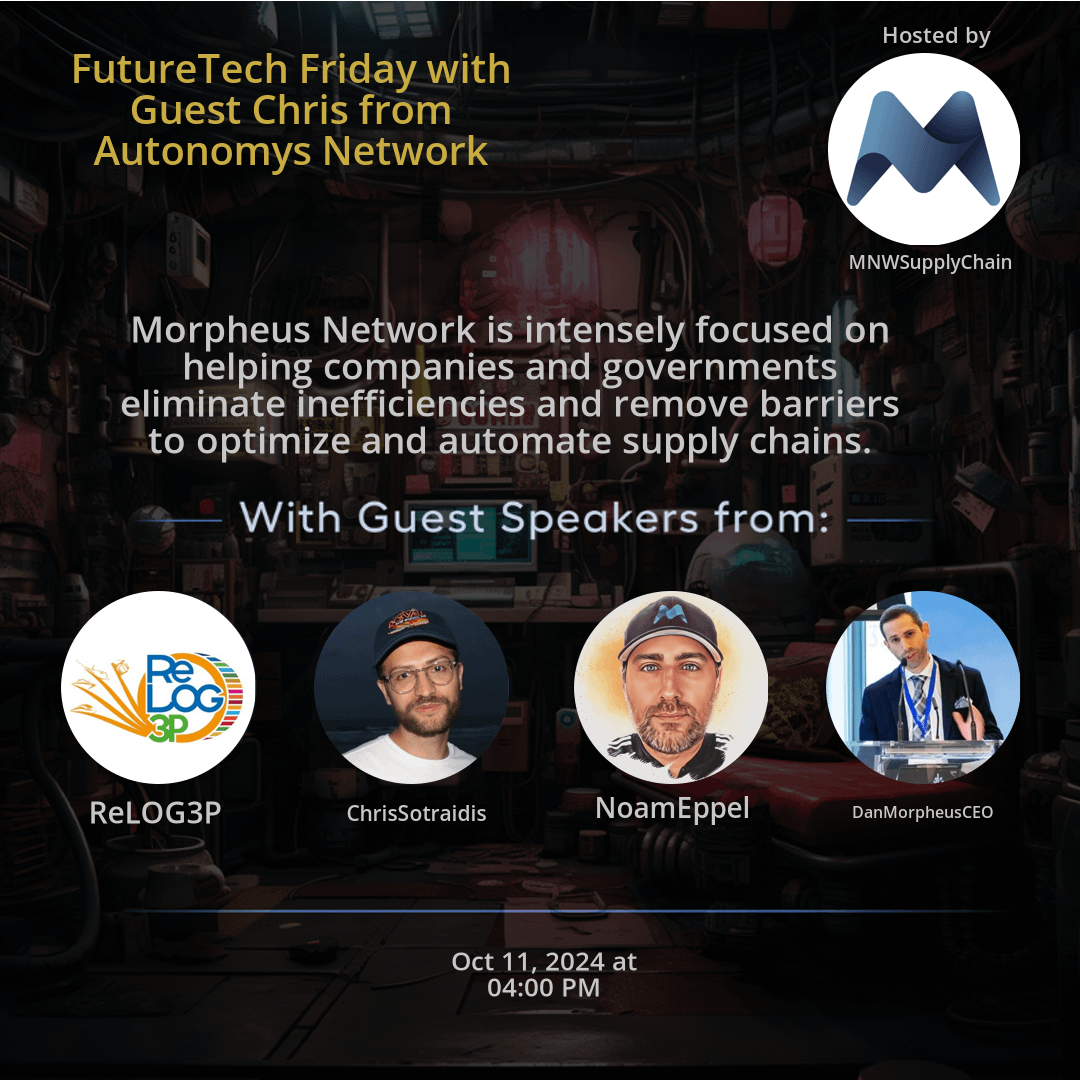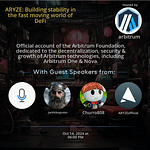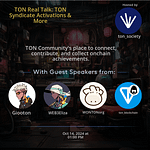Space Summary
The Twitter Space FutureTech Friday with Guest Chris from Autonomys Network hosted by MNWSupplyChain. Exploring the intersection of technology and supply chains, FutureTech Friday with Guest Chris from Autonomys Network delves into the critical role of innovation and automation in optimizing operations. The space emphasizes how partnerships with technology experts like Autonomys Network can revolutionize traditional supply chain practices and lead to cost savings. Through discussions on blockchain, automation, and collaboration, the space highlights the importance of leveraging cutting-edge technologies to stay competitive and efficient in the evolving business landscape.
For more spaces, visit the Infrastructure page.
Space Statistics
For more stats visit the full Live report
Questions
Q: How does blockchain contribute to supply chain transformation?
A: Blockchain enhances transparency, traceability, and security in supply chain operations.
Q: What are the benefits of automating supply chain processes?
A: Automating processes leads to improved efficiency, reduced errors, and cost savings.
Q: Why is collaboration with technology companies like Autonomys Network significant?
A: Partnerships drive innovation, optimize operations, and pave the way for industry disruption.
Q: How can businesses prepare for the future of supply chain management?
A: Businesses should invest in technology, embrace automation, and adapt to digital transformation.
Q: What role does innovation play in optimizing supply chains?
A: Innovation drives efficiency, competitiveness, and resilience in supply chain networks.
Q: Why is supply chain optimization crucial in today's business landscape?
A: Optimization leads to streamlined processes, improved customer satisfaction, and cost efficiency.
Q: How does FutureTech Friday contribute to industry insights on supply chain innovation?
A: FutureTech Friday provides a platform for experts to share knowledge, trends, and best practices in supply chain technology.
Q: What are the key challenges in implementing technology-driven supply chain solutions?
A: Challenges include data integration, cybersecurity risks, and resistance to change within organizations.
Q: Why is supply chain automation gaining momentum in various industries?
A: Automation boosts productivity, minimizes human error, and enables real-time monitoring of supply chain activities.
Q: How can small to medium enterprises benefit from adopting advanced supply chain technologies?
A: Implementing advanced technologies can help SMEs improve operational efficiency, scale rapidly, and compete effectively with larger enterprises.
Highlights
Time: 00:09:15
Blockchain's Transformative Impact on Supply Chains Exploring how blockchain technology enhances trust and efficiency in global supply networks.
Time: 00:12:45
Automation Revolutionizing Supply Chain Management Discussing the benefits of automated processes in optimizing supply chain operations.
Time: 00:17:30
Collaboration for Supply Chain Innovation Highlighting the importance of partnerships in driving technological advancements in supply chain practices.
Time: 00:22:10
FutureTech's Vision for Supply Chain Evolution Sharing insights on leveraging technology for sustainable and advanced supply chain solutions.
Time: 00:28:05
Competitive Advantage Through Technology Adoption Exploring how technology integration can set businesses apart in the competitive supply chain landscape.
Time: 00:32:20
Challenges and Opportunities in Supply Chain Tech Discussing the hurdles and growth opportunities presented by technology in supply chain optimization.
Time: 00:36:40
Innovation as a Driver of Supply Chain Transformation Exploring how innovation plays a pivotal role in reshaping traditional supply chain operations.
Time: 00:40:55
Cost Efficiency Through Technological Innovations Highlighting how technological advancements can lead to cost savings and improved operational efficiency.
Time: 00:45:30
FutureTech's Industry Influence on Supply Chains Showcasing the impact of FutureTech discussions on industry trends and technological advancements in supply chain management.
Time: 00:50:10
Adapting to Technological Disruption in Supply Chains Examining the necessity for businesses to adapt to disruptive technologies for sustainable growth and efficiency.
Key Takeaways
- FutureTech aims to enhance supply chain efficiencies and streamline operations.
- Guest Chris highlights blockchain's role in transforming logistics and supply chain management.
- The focus is on leveraging technology to automate processes for better business performance.
- Discussion centers around optimizing supply chains by eliminating inefficiencies and barriers.
- Blockchain is seen as a key enabler for streamlining and securing global supply chains.
- Collaboration with companies like Autonomys Network can revolutionize traditional supply chain practices.
- FutureTech emphasizes the importance of innovation and technology in shaping the future of supply chains.
- Automating supply chains can lead to cost savings and increased operational efficiency.
- Adopting cutting-edge technologies is crucial for staying competitive in the evolving business landscape.
- The conversation reinforces the significance of technology in driving supply chain evolution.
Behind the Mic
Introduction and Initial Greetings
Close. Hey, how's it going? I can, yes. Hey, Chris, how are you? Good. Not too bad. Who am I speaking to? This is James, general manager over here at Morpheus network. Awesome. We'll give a couple minutes to let people get into the space. And let me grant some permissions here. Of course. Did anybody else catch the Aurora borealis last night? A lot of photos. I did not see it. I'm in Salt Lake City. People drove up a little north to go see it yesterday. It was something else. Really was. You needed to use your camera to really capture its beauty, barely visible to the naked eye. But once you raised your camera to the sky, it was really something else.
Morning Greetings and Participants
Hey. No. Good morning. Good morning, James. How are you? Thank you. Fantastic. Well, it looks like we have Stefano on the line here. Stefano, how are you? Stephanie, I'll set you an invitation to speak. There you go, guys. Good to be here with you. Good to see you. All right. Waiting for Dan to join. I wish I could keep the background music that was so bouncy going. I don't know where it went. There's Daniel. Send you an invite, Dan. There we go. All right, let's get started. Today we have Chris from Anonymous. Net. Nanosnet is a web three based AI platform, decentralized AI platform. We got a lot of questions for you regarding AI 3.0 and what you're currently working on. Of course, I also invited Stefano over from Relog three P. They are one of our partners in Europe who has helped us with joining the European Blockchain Council.
AI 3.0 Discussion Introduction
And we're currently working on a pretty exciting project that we'll let Stefano talk about a little bit as well. The format today is pretty open and loose. You don't have to raise your hand to speak. If you have the talking sick, go ahead and just jump right in. Let's keep the conversation lively. I do want to plug our new podcast that is out on all the channels, wherever you listen to your favorite podcasts. Fix supply chain, fix the world. If you need a link, go to morpheus.net work links, our official link there for our podcast. Please subscribe and comment and share with your friends. We just dropped our third episode, which is worth a listen. It's about 30 minutes. And we encourage everyone to support that new podcast as we talk about bleeding edge technologies in supply chain and logistics.
Supply Chain Technologies Discussion
We talk about AI and blockchain machine learning and what are some of the current trends today in supply chain logistics globally? So let's get started. Chris, big question. Why do we need to decentralize the natural language library, Aihdenhe engines? I'll let you kick it off with that. Yeah, sure. I guess I could start by introducing myself. I'm Chris. I'm the chief of staff at Autonomous Network. So autonomous is the foundation layer for what we're calling AI 3.0, and I can get into that a little bit. But to speak to your point about why do we need to decentralize some AI solutions? We don't want power in the hands of just a few people or just a few organizations that are making big decisions that will have long lasting ramifications on the future of human autonomy, human freedom, and our ability to do things and be people online and live fruitful lives.
Vision for the Future and AI Decentralization
We want a solarpunk future, the kind of future where there's a commingling of solid, smart governance and the kind of technology that we'd want our children to be using, and not a sort of cyberpunk dystopia where laissez faire economics rule and there's no rule of law, and things just run amok. So we want to be able to democratize access so that more people can have a say in what's going on. And as we approach the inevitability of artificial general intelligence and then subsequently afterwards, artificial superintelligence, we want people to have a say. We want people to be able to have some sort of ownership. And we know that the cost of labor every year is going to go down. Right now, it's the most expensive it's ever going to be, not just with mental labor, blue collar work, but white collar work as well, and everything in between.
AI Evolution and Differentiation
So that's kind of my answer in a very short TLDR, but happy to expand on that. So what is the differentiation between AI 3.0 and what we have currently developed by, say, meta or Google or chat? GPC yeah, sure, I can speak to that. So this is kind of an internal thing, but really trying to push for it. So you can kind of think of the evolution of AI being categorized into three broad phases. You can think of the first phase of artificial intelligence being 1950s to the 2010s, where there was centralized machine learning. Deep learning became widespread, with developers being able to build models using tensorflow, Pytorch. And humans were essentially passive consumers of this technology that was provided by big tech.
Phases of AI Development
Right now, we're what we're calling AI 2.0, where we have centralized generative language models and AI. So we have LLMs like Chat, GPT, Gemini, Claude are emerging alongside other generative AI technologies being built by big tech and humans are offered more interactive AI experiences, but these are still being controlled by centralized entities, so that's not ideal. And we know people like web three and like bitcoin for all the reasons you might expect, because it's decentralizing money, it's decentralizing control. So you can think of AI 3.0 as being decentralized and human centric artificial intelligence, open, accessible, collaborative web three enabled AI models that offer app and agent development and deployment.
Decentralized AI's Future
And we think that decentralized nature is going to ensure a more transparent, composable, secure ecosystems across the board, across technology stacks. Humans don't just interact with AI, but they can customize them, train them, use them, and make them highly personalized. And that's where we get into the whole idea of Agentix. So having agents act on your behalf and kind of blurring the boundary between AI creators and consumers. So that's what we are kind of referring to as AI 3.0 or the age of autonomy. We want to get past this age of centralized AI and get into a place where we're giving a little bit more autonomy or much more autonomy to people.
Natural Language Library and Open Source Usage
Does that require building a new natural language library from scratch, or are you leveraging what is currently available through open source? Yeah, I mean, I guess there's a couple of ways you could think about it. I mean, I think a lot of centralized ML solutions exploited a lot of information on the Internet without paying people out. You can think back to people who had thought about this idea a long time ago. I think about writers like Jared Launier, who wrote a book called who owns the Future? And in that book he kind of talks about we're not paying people the information economy, we're not paying people for their time and attention.
Monetization of Data and Ecosystem Opportunities
The classic trope that if you're not paying for something, you're the product or you're being used. So maybe there's a middle ground there where I don't think all the models that are being made need to be completely rewritten, but we have companies like meta who in addition to being rebranded, have tried to foster, are trying to foster ecosystems where it's more open and they're being a little bit more transparent about where the data is coming from. Yeah. Is there an opportunity for folks to be able to monetize their own data if machine learning and AI is sourcing their resources? Right? Yeah. How would that work? Yeah, I mean, there are some solutions online that are like on chain solutions that I'm picking on the exact name right now, but the idea would be just having some degree of ownership and content provenance and tying that back to a decentralized identity like a did or a verified credential that you could tie to things that you publish on the Internet.
Smart Contracts and Content Usage
And that would be so whenever somebody be using that, you could have some sort of smart contract or intelligent contract that would say, hey, if you're using this, you have to pay me XYZ or more things become free. So it would just be up to the person's, up to them, certainly. Understand. Let me give the talking stick to Stefano. Stefano, if you could make a quick introduction of yourself and then weigh in on the conversation and what you're seeing over in Europe right now as it relates to your projects. Yeah, hi guys, I'm Stefano and based in Italy. Indeed partners with Morpheus after sometimes a couple of years. And we basically work specifically on the matters of sustainability within the supply chain.
Morpheus Project and Blockchain Initiatives
And that's where we touch up with Morpheus, in addition to a number of projects that throughout the innovations, we get towards a more effective and efficient supply chain ecosystem. So currently, as it was mentioned, we are specifically working on a project that was a call by EU on blockchain, in the sense of supporting the regulators in identifying the plans of actions as well as streams for financing such kind of plans, and eventually pilot projects within EU and in collaboration with extra EU countries. So we've been selected on this second cohort, so called project with 19 other companies. And the focus is basically leveraging on blockchain and smart contracts related to ease interconnect and create increasing interoperability. We have to consider supply chain and even deeper than the logistics, being a global industry. So we have to stop and to cut on the silos based approach that still today is so heavy in this sense. And that's basically our value proposition within this EU project. We have been selected. So yeah, we are working on the project until the end of the year. After that, we count with the authorities, EU authorities that are participating to the project to select some pilot project, hopefully that we've been working on.
AI Integration in Supply Chain Management
But first, let me to clarify that Morpheus.net work is AI forward company. We integrate AI and machine learning into our enterprise solution as it relates to predicting what documentation may be necessary for a particular workflow for supply chain from end to end, as well as machine learning analytics based on what it understands the logistic hurdles to be right. For instance, if there's weather, particularly in a certain region or if there are congestions at certain ports, machine learning can learn very quickly and advise supply chain managers. What would be the workarounds? How to get the products quicker to market or quicker to manufacturing facilities, raw materials in, products out, that sort of thing. So let me turn it over to Danny. Where do you see AIH as we develop our AI ML solutions within morphinus network platform? Where do you see the future of supply chain optimization using these tools?
Future of Supply Chain and Compliance
Great question, James, and thank you Stefano and Chris for joining us today. And I'll answer that question as well. Obviously, James, but I just want touch on what Stefano said and relate it back to what Chris is saying as well. And as you see, the project that we're doing right now with this european sandbox in regards to a bunch of different things we're looking at when it comes to compliance. They love our Mongolia certificate of Origin project, that automatic documentation on chain using blockchain on the back end, the whole deforestation, the EUDR, the regulation around deforestation, that's coming out as well. And that's like traceability, connecting to blockchain as well. Awesome stuff. The sort of like back end of it all is that they want to have this trusted data on chain and that's this whole 3.0 revolution that's coming out. And we're going to incorporating AI, as you mentioned, James, as we do throughout an entire platform, all our functionality.
AI and Logistics Solutions
We have this amazing HS code AI system. We have systems connected to AI all over the place to optimize with our partners as well, even through, let's say, Google and Google Maps and routing ingestion. But again, when it comes down to it, the way the EU is looking, obviously in the states, actually I'm speaking at that government blockchain association event on November 7 in Washington, DC. Again, that's specifically about blockchain and technologies being used for the government itself. As it's a top down approach that's coming out. We're going to see so many more solutions pushing ahead as the regulation will demand companies to comply. So again, what Chris is talking about, this whole 3.0 of AI, if we're leveraging AI across all our different solutions, they want to make sure that it's actually being decentralized as a part of that sort of like back end.
Consensus Mechanism and Supply Chain Efficiency
So I'm excited for what Chris is doing, what we're doing leveraging blockchain for trusted data and supply chains and then obviously trusted data in AI as well. It's going to be amazing. So great stuff. And that's why I see relating all the way up and down. Yeah, hopefully I covered. Thank you, Danny. Chris, as you understand our project, how do you see proof of archival storage or Pos, working into that tech stack? Sure. I mean the biggest thing with supply chain logistics, and I had worked in the warehouse management system space, WMS OMS space for a bit before getting into web three. So I mean I realize as well as anyone else in the logistics space that scalability and speed are major. You want to have your end to end processes be fast, so you need consensus mechanisms and you need next generation blockchain solutions that are fast proof of our couple storage eventually being sharded.
Scalability and Transparency in Logistics
It's going to overcome a lot of traditional blockchain scalability issues. It's going to be faster. So the modular architecture with domains can definitely support bunch of different logistics specific applications through like domain based execution environments. And that's major because you might have a lot of different types of things you're wanting to do from pickpack ship to everything else in between. Humans, as you guys mentioned on your site, humans are always going to be the number one cause of friction in the global supply chain. And having that level of transparency on the blockchain, that's great. That means that if you have vendors or raw materials that are being produced, it takes the guesswork out of things. But as far as Pos, you know, you're just talking about a consensus mechanism that's green. It's something you can get behind. So we know that supply chain companies want to be viewed by their consumers and customers as green and efficient.
Benefits of a Green Consensus Mechanism
Why not a consensus mechanism that's 99% cheaper and more energy efficient than something like proof of work, while at the same time being just even more decentralized at times. So cheaper, greener, faster, more advanced. There's really no cons. Sure. And those who aren't familiar with domains as it relates to customizable execution environments, how does that aid AI as a, the virtual machine, which is, I think you referred to them as an agent, right. How does that work? Essentially if you've. Can you, can you rephrase your question? I'm sorry, are you just saying your tech stack is built on what you refer to as domains, which as I understand, customizable execution environments, right? That's right. That sort of optimize smart contract consensus validations.
Optimization and AI in Supply Chain Management
But how does that support the virtual machine, which I believe you referred to as an agent, and how does that optimize it for both speed and accuracy? Yeah, I mean it's just going to be something that you can optimize on your end. If people are running their own domains, you can decide how much infrastructure you want to put behind something. So if you're running something that is less resource intensive, you can put less behind it. You have something that's much more resource intensive. A good example would be identity or identity domain would be something that would require a lot less energy and compute because it's simpler. But even something where you have high throughput for something like pickpack ship or labeling, packaging, labeling, something that's constantly happening in a warehouse, you're going to want to put more compute behind that.
Interaction and Conference Insights
Let me turn it over to Noam, chief operating officer here at Morpheus, who is our resident AI Dev Noam. Hey, guys, thank you for that, James. And hey, Chris. Great conversation so far. Chris, are you at the permissionless conference? I am, yeah. I'm in Salt Lake City today. Oh, nice. How was it this year? It's been good. Definitely some relevance for the supply chain space. There was a separate decentralized AI mini meetup yesterday in Salt Lake. So a lot of the stuff that we're talking about on this call today is stuff that was discussed heavily yesterday. So definitely applicable. Amazing. Yeah. Good. Yeah. As you were talking, I was reading up on your poas consensus mechanism which you were just speaking about. And I'm going through your docs.
Documentation and Current Issues
Yeah, I love the docs that you have on your website. You have kind of this academy with some fantastic information. On my screen right now I'm reading about the farmers dilemma, the classic farmers dilemma. Fascinating topic. Can I ask kind of an open ended question to you about what is the farmer's dilemma? Yeah, the farmer's dilemma is about scalability. So in blockchain and decentralized network. Can you guys hear me okay? Sorry, I think I cut out for a second. Yeah. Okay, cool. Yeah. Essentially in blockchain, decentralized networks, there's this kind of issue with scalability. So you have this step, if it gives you a step by step breakdown of a farmer's dilemma in logistics networks, that would be like warehouses being incentivized to maintain accurate inventory reporting discrepancies.
Understanding the Farmer's Dilemma
And so it's kind of like a three part thing with scalability. There's this dilemma that if there's dishonest behavior, that might lead to short term gains, like reduced operational costs. Yeah. Trying to think what else I could say about this, but it revolves around trade offs between contributing resources to the network in good faith versus attempting to game the system, essentially. And our network tries to resolve all of those issues, and we believe it does so successfully. Yeah. Any good blockchain consensus mechanism needs to have a way to kind of penalize bad actors. Right. So for your consensus mechanism, like, what are those steps that you take to penalize those bad actors and.
Auditing and Reputation in Blockchain
Yeah, yeah, that's a great question. Well, there's auditing, that's one thing. Penalizing in a mechanism like that, there'd be slashing of rewards or staking. That's big a reduction in any future rewards. So you've got that history on the chain, and that's super important. So, I mean, the blockchain is great for that. If you can see the history, you know that there's going to be someone's reputation has been damaged, they get blacklisted. So farmers in those networks are going to have reputation stores. They're going to indicate the reliability or trustworthiness. And so that's great. That's exactly what the blockchain is there for. Fantastic.
Decoupled Execution Environments
Thank you, Chris. So decoupled execution environments help us understand how that works. Yeah, of course. Yeah. Decoupled execution is just where the execution of transactions is separated from the actual consensus mechanism. So I mean, that provides some advantages in terms of scalability, flexibility. But in the context of decentralized networks like ours, it allows for different parts of the network to specialize in either processing transactions or maintaining the blockchain security in order for people that are just using it just means it's going to be faster and just as secure.
Digital Identity for Agents
I see. So how do you assign a sovereign digital identity to an agent, to an AI, to a bot? And why is that important? Well, I mean, you want to have, you can't just have. I mean, this is a topic that came up a couple days ago and people were debating about it. Sorry, my screen went black for a second there. Here's how I think about it. Like, you can't just have things that are completely autonomous running on a network with zero responsibility assigned to them or to a person or to an agent or something. You can't just have something running. And this is a topic of debate in a number of panels over the last couple of days that you could just let something run amok. And it's like, well, who's responsible? This is the person that made it responsible. If it's acting completely autonomously, does it have autonomy? Like, are we going to take this, like this computer program to court?
Issuing Digital Identities
So, I mean, you want to create a system where you can have some sort of assignability that's traceable back to a person's account. So deploying an agent within the network where it's deployed by an individual to perform specific tasks. And once an identity issued, in our network's case, like an auto id, it's assigned a digital identity through the system and the protocols used to generate these decentralized digital identities. And they're cryptographically secure, they're linked to a unique key pair, and they're created using cryptographic proofs that ensure and show the authenticity and uniqueness of the agent. So yeah, there's a lot of ways to do that. You can do that with like X 509 VC did. In any event, the whole point is to have that sort of auditability and transparency.
Resources for Developers
Sure. As far as developers environments, what is available to folks who may be interested, say Stepano has a partner or a project that they're working on, and they might want to leverage your decentralized AI agents, what sort of resources are available to them? Yeah, I mean, right now the consensus layer is going to be launched at the end of the month. So right now things were just in Testnet, but there's going to be in the future these modular domain based execution environments. They're going to allow devs to launch their own customizable, scalable compute environments that are tailored for whatever applications you want. They can be AI applications, they can be something else. But the domains act as layer two roll ups or application specific blockchains. So they provide the same level of security interoperability because they resolve on the main chain. So developers can configure the hardware requirements that they need and they can make it as specific as they want it to be.
Competition in the Decentralized AI Space
Is it a competitive space right now? I mean, I know the singularity.net comma, they just want it is competitive. Yeah. So you guys sharing resources essentially then. What can I say about this? I mean, the dai space, the decentralized AI space is very nascent. And right now it's like people are kind of thinking like what are the benefits of having things be more decentralized? And people can see the benefits of things like smart contracts and just things like the Ethereum ecosystem and similar layer ones. But right now a lot of things like if you look at, there's another company called Morpheus or more.net with more token, and they have some things like on chain inference that they're running. That's cool. It's a cool example of something that can be run using decentralized compute, but the tech is very new, so we're going to see we are just right at the tip of possibilities when it comes to decentralizing applications that are running as opposed.
Decentralized vs Centralized Applications
Good examples, paying for OpenAI versus paying for Venice AI. Venice AI is a decentralized app that runs on more.net comma, and it still provides decentralized inference as opposed to centralized inference from OpenAI. What are the benefits of that? I mean, you have a decentralized network that's running it. There's some level of traceability there and more accountability, but it's not necessarily faster yet. So there are trade offs. Certainly. Certainly I can pass it over to Stefano. How does this work into what you're currently working on project wise? And what have you seen going on in Italy or within the EU blockchain community that has synergies with decentralized AI development?
EU Community and Decentralization
Well, actually is something, the decentralization that is the word of mouth after a few years. But in terms of execution, this is still quite a baby in the sense that generally what is being talked in EU in terms of future action and regulation takes some time to start taking the momentum up. So this is definitely a hot topic, but still a long way to be starting a real and strong execution nonetheless. Let's say it already is planned to cover several aspects of the businesses and the society in general. So I would say for those that started the journey some time ago, right now is the moment to be there because still the field is quite green. So we are in the right place in the right moment.
Future in the EU Ecosystem
First movers, if I have to share my feeling in being inside this EU ecosystem. No, Dan, give me an opportunity to ask some questions. Yeah, I was just going to hop in and sort of second what Stefano was saying there. But, like, we see that with many different sort of technologies and how quickly this can come into play, it's like a set of dominoes, right? We're going to push those dominoes over. And I really feel that we're seeing so much news on a government level. It's the people that are asking for it, and then the leaders are responding to that. So I feel that the implementation of these blockchain based systems are going to happen. Web 3.0 is going to happen a lot faster than people actually think right now. Then again, I also thought that in 2018, so I will call myself out on that maybe is my level of excitement with this technology.
Incorporating AI into Everyday Tasks
And I see, you know, the sort of potential that's going to bring. So I do love what we do, and I do love that we're bringing it to the world so, Stefano, I thank you for joining us, obviously, and also working on this project with the EU sandbox has been awesome. And James, thank you as well for having me on as well. It is a pleasure, Dan. And guys, I actually, as you get excited and looking forward because, yeah, for those like us that has this inside, after a while, we just really want to see this pumping up very fast. Right. Commonly we see a lot of people attaching themselves to AI and ML with their technologies. It's a buzzword. Everyone's excited. They know that it's trending right now.
Challenges in AI Adoption
We see it in our competitive space, which in supply chain logistics solutions. But there's really, they haven't actualized the other than having bots that, the customer service bots that anticipate questions or give knowledge bases, that sort of thing. We haven't really seen anybody leveraging it to the point where it's becoming actionable. But for those of us who are working on it, how would you think, and I'll turn this over to noam, how is this going to be a differentiating factor above and beyond what the obvious value is to be able to have this leading edge technology built into solution sets? Where do you see the chasm, if you will, like, what's it going to take for mass adoption from. We have early adopters right now leaning in.
The Path to Mass Adoption
They want to be part of it. They understand that there is obviously quick times to value with leveraging these fairly inexpensive tools to automate and, or to automate processes, business processes. But what do you think it's going to take to trigger that mass adoption across erps and warehouse management systems and trucking and logistics, as well as just general business intelligence? Business intelligence platforms, which to date have always been really large data set driven with classic, you know, data analytics. Right. The difference between data analytics and machine learning is vast. Right. So it's a loaded question, though. But you could.
AI Integration in Business Processes
Yeah, yeah. A lot of great thoughts in there. I think. You know, what we're going to see very soon is that AI is going to be incorporated into every single process that you do, not simply in supply chain, but just in your day to day job. Whether you're writing a proposal or working on a presentation or doing some negotiation or strategizing or designing software, whatever your process is, there's going to be an AI component that's going to help you do your job. For some tasks that you do, maybe you'll have AI handle 90% of it and then the human aspect will do the remaining 10% for other tasks maybe humans will do 95% of it, and then you'd have AI handle that last 5%. But without question, every task, every process will have an AI component to it.
The Role of AI in Standardization
AI is going to become standard in that sense. And you asked what's going to spark mass adoption. You always, always need to take it back to the user. What is the benefit to the end user? And what's interesting about our industry supply chain is that, you know, it's quite easy to identify benefits for the end user. One project we're working on right now is a software designed to help handle and manage complaint resolutions. So you can imagine if you have a product in a grocery store and someone purchases it, and they realize that product maybe has expired a few days ago. That may be one example of a complaint, or if the packaging has the wrong information, whatever kind of complaint that is. We're working with a client at the moment that has to handle a very high volume of complaints, thousands of complaints. And AI can help. So we're looking to incorporate AI into this process to help automate a lot of these complaints with some predictive analytics and to really streamline that whole process to. To them. So that's one quick example of how we're utilizing AI today to help bring benefits to our customers.
Benefits Driving AI Adoption
And, yeah, mass adoption really comes down to what is the benefit for the end user? Can it save them time? Can it save them money? Can it make their day to day job easier? Can it make their life happier? And when you figure out how to do that, how to make sure the end user has benefits, that's what sparks mass adoption. Certainly, in the immortal words of Lacusis Borg, resistance is futile. A lot of people don't even realize that they're using AI. Just, I mean, if you're on your smartphone, right, and you're texting your friend, AI is predicting what you're trying to write and making suggestions, right? That is at the very core of it. That's. It's already in just about everything we use. Chris, I see you have your hand up. I do, yeah. So let me put my hand down before I start talking. I don't want to have it up forever.
Reflections on Previous Tech Disruptions
No, it's Apple. Is it? It's up again. Jesus. Let me wave. Maybe. Is there any way to make it go away? Okay. There we go. Yeah. I would say to start, I agree with everything you mentioned. I always think back to the.com boom and big players like Walmart that just, you know, in hindsight is always 2020. It's like obvious that the Internet was going to be this big thing now, but it wasn't necessarily as obvious back in like 1996. I think the same thing is true with AI being implemented in just about every field. So I mean, I think there needs to be that clear demonstration of ROI and value, but I think that it's possible that just like with every other industry, there's going to be disruptors. There's going to be small teams of people that are going to build supply chain logistics, third party logistics software, order management software, IMS solutions that are going to be made by smaller teams using maybe software like cursor and rapidly iterating and providing people what they want.
Navigating AI in Supply Chains
There's so many examples. I agree that ultimately the customer needs to benefit. I think AI driven demand forecasting, that's great for reducing overstock. Like you don't want to have a warehouse filled with stuff. And we've seen this years ago where WMS solutions were tinkering around with this idea of using AI powered demand forecasting. And that's great because you don't want to have a warehouse filled with stuff that people aren't buying and you don't want to buy something that no one wants to buy from you. I think beyond that, you have all these enterprise solutions, Oracle and all these other things that people have used for years. And you guys probably know as well as I do that when people get onto a software suite, especially if they're a large enterprise organization, they're going to be on there for a while, especially ERP software and logistics platforms.
Impacts of AI on Job Functions
So having flexibility can come interesting ways. And I think we're going to see some moments where you don't necessarily need to change the software, you can just change how is being interacted with. I think a good example would be like, I mean, we've seen the chat bots. That's great. It's obvious that is a disruptor and customer service jobs are going to go away and you're going to have people that are just at the top that those things are escalated to and there's like not any and people just won't do those jobs anymore. But I think back tools like multion where you can have a cloud based solution that's in a virtual machine, where you have some sort of agentic platform that's a running legacy software and is pointing and clicking and doing things. And, you know, for each bot that you have running, that's doing that's automating something, that's a person's job, that's someone that was like maybe on the warehouse floor doing something that no longer has to do that thing, and it's probably faster and more efficient.
Future of Workforce and Automation
So I think that, like, sure there's going to be, we want to see like the ROI and clear demonstrated value, but I also think that the space will probably, just, like with every other space, is going to be interrupted by startups. It's going to be interrupted by companies that are rapidly iterating, are using all these things like demand forecasting, and then beyond that. I think most importantly, just the workforces across the entire globe need to be more flexible when it comes to reskilling. Automation is changing in different ways and it's coming for our brains. So that's just going to have long lasting notifications. We could talk about this forever, but it's hard to even know where to end with the discussion because it's just going to envelop everything.
Skills in Demand for the Future
No, absolutely. That's always been the argument that automation and robotics is replacing human jobs, but it really isn't. It's requiring the workforce to become more skilled because it takes a dozen people to make an optimist robot and even more to operate it on the back end. It may be pouring your coffee and sweeping your floors, but there are no humans who are willing to do that anymore. Why wouldn't you give it to a $30,000 robot from Elon Musk to do? But it still takes multitudes of people to service it and build it. And that's it for those who aren't skilling up. And that's not necessarily getting an MBA, but going to a trade school and learning, you know, mechanical engineering, right? Or, you know, or, you know, electrical circuitry and, you know, all of those skill sets that are required now for even, you know, even fixing a furnace, for God's sakes.
Conclusion and Resources
I mean, I have a german furnace with a motherboard that, you know, most people just scratch their head when they look at it. They're like, I don't know. You know, the typical guy who shows up is, I don't know how to fix that. Well, you need to figure that out because those are replacing, you know, the solid state boards of the past. So with that, I guess we'll wrap up. I just want to plug our podcast one more time. Fix supply chain, fix the world. It's available on wherever you enjoy your podcast. There is a link on our official links page, morpheus.net work links, where you can also find our other social channels. If you're interested in learning more about Morpheus network. Also, we have some thought leadership around our projects with relog on our medium site. Please dive into those. That's some fascinating work.
Engagement and Future Developments
And we'll have more announcements as we continue to build with relog on the European blockchain sandbox. We'll keep you up to date with that. And Chris, if you want to just close it out real quickly on how people can get in touch with you guys and get involved and where to find additional informations about autonomous network. Sure. Yeah. I mean, this is a, first off, thanks so much for having us. Secondly, we're launching the blockchain here in a couple of weeks, so be on the lookout. The best way to do that is to join our discord. So you can find that by going to autonomous XYZ. Really excited. Follow us on Twitter. Follow me on Twitter if you want. I don't always post about technology.
Looking Ahead
It doesn't have to always be serious, but, yeah, really exciting year. It's just very clear that AI is impacting everything. But for people like us on the call, we're trying to take it in stride and move forward and learn and grow and use the technology, and I think it's going to ultimately result in a brighter future. Autonomous XYZ, certainly. And Stefano, I'll give you an opportunity as well to give a plug to relog. You're muted. Your mic's off. Oh, he might have dropped off. All right, well, thanks very much, everyone, for joining. We will resume a week, two weeks from today with another some more guests. And though that has not been determined yet, keep an eye on our socials as we firm up who our next guest will be on future tech Friday here at Morbius Network. Thanks very much, everyone. Have a great weekend. Thanks so much. Have a good one. Thank you all. Thank you so much, guys.







